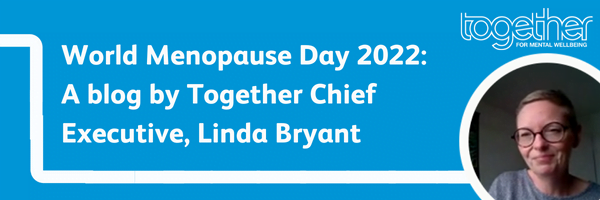World Menopause Day 2022: A blog by Together Chief Executive, Linda Bryant
World Menopause Day takes place on 18 October each year to raise awareness, break the stigma and highlight the support options available for improving health and wellbeing. Here our Chief Executive Linda Bryant has written a blog on the topic that was originally prepared for the Association of Chief Executives of Voluntary Organisations. In the blog Linda share her own lived experience of the menopause how there are similarities with that and mental health issues and how Together looks to support people.

Earlier in the year, I addressed the annual conference of the Association of Directors of Adult Social Services on one of their policy priorities – social justice and inclusion. An audience of around 200 leaders of social care heard me say that the transformation of care and support of people experiencing mental distress, the sector in which my charity operates, needs to be based on fairness and equity of opportunity – each person experiences a unique set of circumstances that bring daily challenges and that support must be tailored to meet the person’s needs, which are deeply personal and often requiring a deeply practical response.
I then did something that I had never done before in front of a large audience of mostly people I had never met before. I talked about my own challenges of being in the depths of the menopause impacting my memory, concentration and emotional wellbeing, bringing odd and unexpected physical conditions, some short-lived, some more lasting. I didn’t dwell on the detail, but the point was to illustrate that they wouldn’t know these things just by looking at me (my days of flushed face, sweaty brow and flapping useless bits of paper to cool down are behind me). The same can often be said for people experiencing mental distress – you don’t know how you can help unless you ask and spend time with the person to understand what they want and need.
At Together, we have been asking our staff and volunteers what they want and need in the workplace so that they can bring their whole selves to work and go home knowing they have been supported to do the best job they can. We invited people to set up self-determining inclusion groups and one of those groups was of people who are peri-menopausal or menopausal. Perhaps not surprising as 70% of our workforce are people who may experience the menopause at some time in their life, a characteristic of the health and social care sector, and of those, 51% are over 40 years of age.
We did have a menopause policy in place prior to the group forming but we now have more resources on our staff intranet and amended our absence recording to include symptoms of the menopause – this one is important. It ensures managers must now have conversations about the impact of the menopause for people coming back to work from a period of absence and determine what additional support they may need. What the group also does is provide a safe space for people experiencing perimenopause or menopause to get support from each other. And that has included me as the CEO. It’s not always easy having the boss in staff fora, but the invitation from the group to me has been warm and generous.
I’m very open about how the menopause impacts me with colleagues across the organisation with whom I work alongside. That’s how I am but it’s also because I have had to make some very practical adjustments – I tell people my brain is less agile at the moment due to the menopause and I have to write down long-hand notes otherwise I won’t remember things. That takes a bit more time and people have to be patient with me. It’s also because I believe as a leader and a woman, I see it as my responsibility to advocate for women-specific issues that often get overlooked in this world that is still built for men and by men.
If you are not convinced there is a case to specifically address the needs of peri-menopausal and menopausal people in your workplaces, then you should read the report from the group of MPs that make up the cross-party women and equalities committee. Published in July of this year, it made for stark reading, citing employer’s lack of support for menopausal symptoms pushing ‘highly skilled and experienced’ people out of work and calling for the menopause to be a protected characteristic under the Equality Act.
Engaging and collaborating with your workforce before legislation compels you will inspire confidence in your leadership, your authenticity to do the right thing by your staff and translate the vision you have of creating an inclusive and diverse workplace into reality. Leadership is also about self-awareness. As delegates departed from the ADASS conference, I had encouraging comments, from both men and women, about the impact of sharing my ‘lived experience’, my honesty and positivity. There are some days when the experience of the menopause is far from positive, so speaking up as a leader on the things that are important to our workforce is not only the right thing to do but can help our own resilience and emotional wellbeing.


